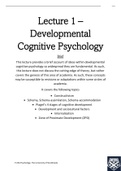0
Lecture 1 –
Developmental
Cognitive Psychology
Brief
This lecture provides a brief account of ideas within developmental
cognitive psychology so widespread they are fundamental. As such,
this lecture does not discuss the cutting-edge of theory, but rather
covers the genesis of this area of academia. As such, these concepts
may be susceptible to revisions or adaptations within some circles of
academia.
It covers the following topics
• Constructivism
• Schema, Schema-assimilation, Schema-accommodation
• Piaget’s 4 stages of cognitive development
• Development and sociocultural factors
• Internalisation
• Zone of Proximate Development (ZPD)
Y1 BA Psychology, The University of Strathclyde
, 1
Jean Piaget: Constructivism, and constructivist learning
Constructivism
Constructivism is a school-of-thought regarding the underlying mechanisms learning.
Today, its notions are seen as common sense, however historically their position was
seen as radical compared to behaviourist accounts. Constructivism stresses the
importance of internal processes by which individual’s construct large
comprehension-systems (called schemas) and utilise these meaning structures to
optimise their future actions.
Schema
Schemas are meaning structures compiled iteratively from experience. From a
constructivist view, individuals have an internal scientist testing the environment to
find overlapping clues, from which generalisable patterns can be noticed and
employed to aid future decision making. This scientist is also a builder, constantly
constructing schemas As such, constantly, schemas are employed to aid individuals
in tasks, such as movement, social interaction, language, etc.
Assimilation, and Accommodation
If an experience fits within the schemas an individual holds, that experience is said
to be ‘assimilated’ (a word used in the biology of digestion, interestingly.) If an
experience does not fit within the schemas an individual holds, ideally the individuals
schema’s are adjusted to ‘accommodate’ this new information.
Accommodation refers to the process of amending existing schemas to incorporate
learned experiences which cannot be assimilated.
Example
A young child growing up in an urban environment may be on a long, and unusual
road trip to see distant relatives. On this trip, they see a cow. After some
deliberation, the child says ‘look, big dog!’. Presumably, the child has not seen cows
before, and is struggling to match what they are seeing with the schemas they
currently hold. As the cow’s shape has similarities to a dog, this is the best-matching
animal the child can guess the cow to be.
Within the example above, the child may be told that that is not a dog. As such, the
child’s schemas cannot assimilate the animal they are seeing. Then, they are told
that the animal they are looking at is called at ‘cow’. The child constructs a new
schema for large, four legged animals: ‘Cows’. The child’s schema structures have
accommodated for the conflicting information.
Y1 BA Psychology, The University of Strathclyde





